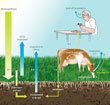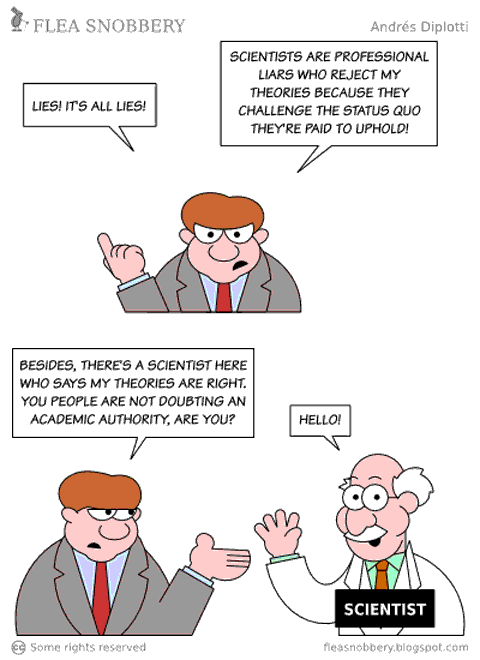This perceptive little cartoon comes from Argentinian Andrés Diplotti’s Flea Snobbery blog (La Pulga Snob, in the original Spanish), but perhaps most amusing is the way I found it… I noticed hits coming in from the comments under the Spanish version of the cartoon, and on investigation they turned out to be from a link (by Andrés) to my Don Easterbrook graph-fiddling exposé. I wonder if by chance there’s any resemblance between the elderly scientists? ![]()
Category: Climate cranks
Monckton: the final slapdown
 Britain’s most bumptious climate crank, Christopher, Viscount Monckton of Brenchley, deputy leader of the UK Independence Party (a party so fringe it probably has a surrey underneath) and inventor of a cure for AIDS, multiple sclerosis, influenza, and herpes simplex VI, gave evidence to a US Congressional committee last May at the invitation of the Republican party. As Monckton watchers might recall, his testimony was riddled with errors, and now a team of top scientists (including the one he threatened to sue, John Abraham) have submitted a detailed rebuttal [Response to Monckton (PDF)] to Congress. Skeptical Science has all the details, and Leo Hickman at the Guardian covers the story here, but for connoisseurs of the potty peer, his email to Hickman responding to the rebuttal is a minor classic:
Britain’s most bumptious climate crank, Christopher, Viscount Monckton of Brenchley, deputy leader of the UK Independence Party (a party so fringe it probably has a surrey underneath) and inventor of a cure for AIDS, multiple sclerosis, influenza, and herpes simplex VI, gave evidence to a US Congressional committee last May at the invitation of the Republican party. As Monckton watchers might recall, his testimony was riddled with errors, and now a team of top scientists (including the one he threatened to sue, John Abraham) have submitted a detailed rebuttal [Response to Monckton (PDF)] to Congress. Skeptical Science has all the details, and Leo Hickman at the Guardian covers the story here, but for connoisseurs of the potty peer, his email to Hickman responding to the rebuttal is a minor classic:
The scientists were unaware of my letter to Congress because they did not have the good sense or courtesy to contact me – or even to contact the vast majority of the scientists whose conclusions I had cited – before circulating to friendly news media their prolix, turgid, repetitive, erroneous and inadequate response to my testimony. From their calculatedly furtive approach, it is legitimate to infer that their exercise was motivated more by politics than by science. One of the lead authors is currently under criminal investigation for alleged fabrication of results: another has been caught out in repeated lies: a third admits to suffering a mental disability: and many of the scientists whom these lead authors invited to contribute are among the long-discredited clique of Climategate emailers. Accordingly, it is unlikely that Congress will pay much attention to their political rant, which displays a lamentable absence of quantitative detail and a pathetic reliance on fashionable but questionable forecasting techniques that have long been compellingly contradicted by hard data.
I’ve highlighted the best bits. Perhaps he was upset that the scientists point out that his testimony that ocean acidification could not be caused by CO2 provides “a compelling example of his lack of understanding of ocean chemistry”. I await his 400 page response with interest… In the meantime, let’s just revel in the breathtaking hypocrisy that has become the good Lord’s hallmark.
The “inconsistencies” of Chris de Freitas
 Auckland University associate professor Chris de Freitas (yes, that one) is a favourite of the NZ Herald opinion editor, regularly popping up in the paper to argue a sceptic line on climate change or, as has happened a couple of times recently, to talk about responses to earthquake disasters. Quite why the paper would go to CdF for the latter when there are many other better-qualified academics who could address the issue remains to be seen, but his article in response to the Canterbury quake in yesterday’s Herald was interesting. Compare and contrast CdF, 6/9/2010:
Auckland University associate professor Chris de Freitas (yes, that one) is a favourite of the NZ Herald opinion editor, regularly popping up in the paper to argue a sceptic line on climate change or, as has happened a couple of times recently, to talk about responses to earthquake disasters. Quite why the paper would go to CdF for the latter when there are many other better-qualified academics who could address the issue remains to be seen, but his article in response to the Canterbury quake in yesterday’s Herald was interesting. Compare and contrast CdF, 6/9/2010:
The focus on earthquake-disaster planning and crisis management is on risk reduction, readiness, response and recovery. In this context, government and local authorities have the responsibility to minimise social vulnerability and have a duty to promote community resilience through enlightened planning.
… with CdF, 1/5/09:
No one knows for sure what the future holds, but there are some good clues as to what’s going on. It hinges on growing evidence that natural influences on climate are in fact stronger than any man-made greenhouse effect. It may be premature to discard our anxiety over the threat of possible human-caused global warming, but this anxiety should not be based on ignorance of what science can tell us.
So for earthquake hazards, de Freitas is happy to argue for risk minimisation despite imperfect knowledge of the size of the risk (his piece looks into failed attempts to predict quakes), but when it comes to climate issues his argument is we shouldn’t do much because we don’t know enough!
Another example of the remarkable intellectual flexibility we have come to expect from the scientific advisor to NZ’s Climate “Science” Coalition. Or perhaps it’s simple hypocrisy. You decide…
Report clears IPCC head Pachauri, UK paper apologises
 Back in March I posted on IPCC Chairman Rajendra Pachauri’s stout defence of the IPCC report against the attacks to which it was being subjected by hysterical denialism. But he has also had to defend himself against accusations in an article by Christopher Booker and Richard North in the Sunday Telegraphin December which claimed that the UN climate chief was “making a fortune from his links with ‘carbon trading’ companies” and that payments from his work for other organisations “must run into millions of dollars”.
Back in March I posted on IPCC Chairman Rajendra Pachauri’s stout defence of the IPCC report against the attacks to which it was being subjected by hysterical denialism. But he has also had to defend himself against accusations in an article by Christopher Booker and Richard North in the Sunday Telegraphin December which claimed that the UN climate chief was “making a fortune from his links with ‘carbon trading’ companies” and that payments from his work for other organisations “must run into millions of dollars”.
KPMG was engaged by The Energy and Resources Institute (TERI), the non-profit organisation Pachauri heads, to conduct an independent review of personal financial records of Dr Pachauri and other records of TERI to confirm if there is any evidence that suggests that Dr Pachauri misused his position for personal benefit as alleged.
The KPMG report has now been made public. The Guardian reports:
“The KPMG audit, completed in March, showed the allegation that Pachauri had made millions of dollars could not be further from the truth. In addition to his annual salary of £45,000, the auditors found that in the period 1 April 2008 – 31 December 2009, Pachauri received 20,000 rupees (£278) from two national power commissions in India, on which he serves as director; 35,880 rupees (£498) for articles and lectures; and a maximum of 100,000 rupees (£1,389) in the form of royalties from his books and awards.
“Any money paid as a result of work that Pachauri had done for other organisations went to TERI. The accounts also show that Pachauri also donated to the institute a lifetime achievement award from the Environment Partnership Summit – a 200,000 rupee prize he would have been entitled to keep.”
The Sunday Telegraph has removed the article from its website and apologised, hardly handsomely but apparently to avoid libel proceedings:
“[The article] was not intended to suggest that Dr Pachauri was corrupt or abusing his position as head of the IPCC and we accept KPMG found Dr Pachauri had not made ‘millions of dollars’ in recent years. We apologise to Dr Pachauri for any embarrassment caused.”
George Monbiot has made trenchant comment.
“Has anyone been as badly maligned as Rajendra Pachauri, chairman of the Intergovernmental Panel on Climate Change ?
“…The story immediately travelled around the world. It was reproduced on hundreds of blogs. The allegations it contained were widely aired in the media and generally believed. For a while, no discussion of climate change or the IPCC appeared complete without reference to Pachauri’s ‘dodgy’ business dealings and alleged conflicts of interest.
“There was just one problem: the story was untrue.
“It’s not just that Pachauri hadn’t been profiting from the help he has given to charities, businesses and institutions, his accounts show that he is scrupulous to the point of self-denial.”
The Sunday Telegraph article also complained that we don’t know “how much we all pay him” as chairman of the IPCC. The answer, as Monbiot reports, is nothing. This was information that the journalists could easily have obtained but driven by their intention to malign preferred not to.
This won’t be the end of the matter for denialists of course. North on his blog puts the apology down to the paper’s need to avoid libel proceedings from an “unethical law firm” and continues undaunted:
“If you wish to believe that means Pachauri didn’t make millions of dollars, that is your affair. But the crucial thing is that the paper has not apologised for accusing Pachauri of making millions of dollars. That accusation stands uncorrected. The paper simply accepts that KPMG has a claim in this respect.”
Monbiot expects that the smear campaign will continue, and become ever more lurid as new charges are invented.
“The best we can do is to set out the facts and appeal to whatever decency the people spreading these lies might have, and ask them to consider the impact of what they have done to an innocent man. Will it work? I wouldn’t bet on it. As we have seen in the United States, where some people (often the same people) continue to insist that Barack Obama is a Muslim and was born abroad, certain views are impervious to evidence.”
If we need reminding, denialism will stop at nothing in its campaign to denigrate the science of climate change. That is what the attacks on Pachauri are about. He is chairman of the IPCC. Portray him as dishonest and hope thereby to spread doubt about the IPCC reports. It is determination to suppress the science which informs the attacks on him and on the scientists who have been falsely accused of various malpractices.
Friday’s dust
 The weekend’s coming, and so I’m clearing out some of the stuff that’s cluttering up my web browser. NIWA recently posted an excellent explanation of the carbon/greenhouse gas relationship in pastoral agriculture, taken from the July issue of their magazine, Water & Atmosphere: Why isn’t grass in, methane out, carbon neutral? Click on the image above to see the carbon flows in a typical paddock. The article’s a good overview of why agricultural methane’s important, worth a read.
The weekend’s coming, and so I’m clearing out some of the stuff that’s cluttering up my web browser. NIWA recently posted an excellent explanation of the carbon/greenhouse gas relationship in pastoral agriculture, taken from the July issue of their magazine, Water & Atmosphere: Why isn’t grass in, methane out, carbon neutral? Click on the image above to see the carbon flows in a typical paddock. The article’s a good overview of why agricultural methane’s important, worth a read.
Lord Nick Stern is giving this year’s Sir Douglas Robb Lectures at the University of Auckland (Sept 8 – 10, with live link to Wellington), on Managing the risks of climate change, overcoming world poverty and creating a new era of growth and prosperity: The challenges for global collaboration and rationality. Over three nights he’ll be considering how we can reconcile dealing with climate change while promoting development where its needed, the sorts of policies required, and the global context for action — developing themes from his book A Blueprint for a Safer Planet. I hope Key and co are paying attention…

